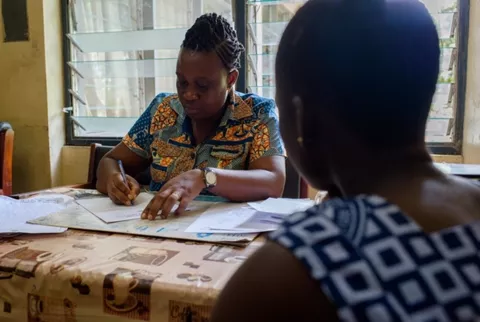Sadik was five when he lost both parents. His extended family placed him in Mercy Children's Home, a residential care facility in the Sagnerigu Municipal District. Sadik stayed in this facility until he became 17. There were 11 other children, including five boys and six girls. Sadik recalls that life was challenging sometimes, as family visits were not allowed. He said, "I could not understand. I knew I had family members. But I could not see them whilst growing up. I became frustrated." When he was at Mercy Children’s Home, Sadik was allowed to go to a nearby school, but all schoolmates were from the same residential care facility. "Growing up, I had only friends from that facility. They were nice, but I was always curious to connect with other kids in the community. They seemed free." - Sadik testified. Also, he faced more difficulty when the facility manager asked him to convert to another religion.
In 2020, the Government of Ghana chose Sagnerigu Municipal District as one of the first 60 districts to implement the Integrated Social Services (ISS) programme with support from UNICEF and USAID. ISS aimed at strengthening social service delivery at the district level to meet the most vulnerable children's needs. One of the interventions that Sagnerigu Municipal District prioritized through ISS was ensuring the care and protection of children without parental care so that they grow up in a loving and protective family instead of an institution. "Thanks to ISS, we learned that institutional care should be the last resort. Family is the foundation for children's well-being, and it is our responsibility to ensure that," recalled Mr Fataw, the Head of Social Welfare and Community Development in Sagnerigu Municipal District. “Thanks to ISS, we were trained and equipped with resources to implement the Standard Operating Procedures (SOPs) for inspection and monitoring of residential facilities. We found some unregistered and unregulated facilities that had to be closed down," he added. Mercy Children's Home was one of the facilities earmarked for closure in 2020.
The District Social Welfare and Community Development (DSWCD) officers, with support from the Regional Director of Social Welfare and Non-Profit Organization (NPO) partners, Brave Aurora and Markaz Al-Bishara, conducted careful child assessment and came up with proper care plans for all 12 children placed in Mercy Children's Home as per the Case Management SOPs for Children in Need of Care and Protection.
All the cases were recorded in the Social Welfare Information Management System (SWIMS). SWIMS is a digital case management system by the Ministry of Gender, Children and Social Protection with support from UNICEF. The cases were tracked, and the case workers and managers monitored the progress. The Mercy Children's Home manager also understood the situation and supported family tracing and reintegration preparation.

Before, during and after reintegration, Sadik and his extended family members received continuous counselling support to prepare for the transition. "I was very happy that I could live with my family. But at the same time, I was nervous. What if my cousins do not like me? But counselling helped me calm down, prepare to start a new life, and bond well with my new family. It helped," Sadik recalled.
Thanks to ISS, Sadik's family benefited from free National Health Insurance Service and educational support. "Because all key stakeholders involved in children's affairs were trained on the Inter-sectoral Standard Operating Procedures through ISS, it was easy to talk to other sectors for referrals and support smoother reintegration," said Mr Fataw. Now Sadik is thriving with his family. He is a final-year student studying business. He aspires to be an entrepreneur, owning the biggest restaurant in the North.
"Being with the family is the best thing that has ever happened to me. Now I have more friends outside of the institution. I can explore other places freely in my community,"
"I love teaching my cousins how to read and play with them. They are my family," added Sadik.
With the continuous support from DSWCD officers, the management of Mercy Children's Home closed down the facility in 2020 and has recently transformed it into an NPO providing after-school education for vulnerable children in the community. "It has not been easy to close down my usual business. However, I learned that this is the best way for everyone, including my organization and the children in this community," said the former manager of Mercy Children's Home. "We receive regular monitoring visits by DSWCD officers to ensure our new service is child-friendly and promotes child rights," he explained.
The story of Sadik has a happy ending. However, there are still several unlicensed and unregulated residential facilities in Ghana, with an estimated 3,000 children living under various conditions. UNICEF works with the Department of Social Welfare under the Ministry of Gender, Children, and Social Protection to inspect and monitor these facilities. According to the laws and policies in Ghana, it is discouraged for children to remain in residential homes. Rather a family home is preferred where a family can love, cherish, protect and guide them to reach their full potential. Options like kinship and foster care are also available in Ghana to avoid the unnecessary institutionalization. Still, more work needs to be done to strengthen community gatekeeping mechanisms and empower families to prevent unnecessary family separation, including children living with disabilities.
The Integrated Social Services (ISS) is helping stakeholders working in child protection, social protection and health to work together holistically to maximize their resources and provide appropriate social services for the vulnerable, especially children and women. UNICEF, with generous support from USAID and partners, has supported 160 out of the 261 districts to implement ISS across Ghana reaching 108,515 vulnerable children including 2,700 children without parental care.



